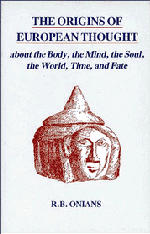Book contents
- Frontmatter
- Contents
- Preface to the first edition
- Preface to the second edition
- Introduction: The Earliest Greeks
- PART I THE MIND AND THE BODY
- PART II THE IMMORTAL SOUL AND THE BODY
- Chapter I The ψυχή
- Chapter II The Genius, Numen, etc.
- Chapter III Anima and Animus
- Chapter IV The Knees
- Chapter V The Strength
- Chapter VI The Stuff of Life
- Chapter VII River-Worship and some Forms of the Life-substance
- Chapter VIII The World: Beginnings of Greek ‘Philosophy’
- Chapter IX Death and Cremation
- Chapter X The Offerings to the Dead and to the Gods
- Chapter XI Nectar and Ambrosia
- PART III FATE AND TIME
- ADDENDA
- Indexes
Chapter VIII - The World: Beginnings of Greek ‘Philosophy’
Published online by Cambridge University Press: 06 August 2010
- Frontmatter
- Contents
- Preface to the first edition
- Preface to the second edition
- Introduction: The Earliest Greeks
- PART I THE MIND AND THE BODY
- PART II THE IMMORTAL SOUL AND THE BODY
- Chapter I The ψυχή
- Chapter II The Genius, Numen, etc.
- Chapter III Anima and Animus
- Chapter IV The Knees
- Chapter V The Strength
- Chapter VI The Stuff of Life
- Chapter VII River-Worship and some Forms of the Life-substance
- Chapter VIII The World: Beginnings of Greek ‘Philosophy’
- Chapter IX Death and Cremation
- Chapter X The Offerings to the Dead and to the Gods
- Chapter XI Nectar and Ambrosia
- PART III FATE AND TIME
- ADDENDA
- Indexes
Summary
The thought traced that it is the ‘fluid’ in which life is and by which life is generated not only appears from Homer onwards in the recognition and worship of rivers as the generative powers (see pp. 229 ff.), but it also has its cosmic correlate. For Homer the ‘generation’ (γένεσις) ‘of all’ (πάντεσσι) is the river ʾωκεανός (Okeanos) which surrounds the earth and is associated with ‘mother Tethys’. τὸ γὰρ ὕδωρ πάντων ἠ зωή says the scholiast, which reminds us of the concept of αἰών above. γένεσις suggests the process or, in this context, the substance rather than the agent of generation. That Homer uses it twice of the cosmic river and not elsewhere of gods, men, or animals, which are agents, ‘fathers’, can scarcely be accidental. In the body it is, we have seen, the sources of generation for which men feel awe and by which they swear. Thus perhaps (cf. ἠνορέην on p. 246) we can better understand why the ‘greatest and most awful oath for the blessed gods’ is by the water of the river of the underworld, the water of Styx proper to the dead.
If such beliefs were current and traditional, we might expect them to be the starting-point of the earliest (Ionian) ‘philosophers’ in their views of ϕύσις or, as Plato interprets, γένεσις, ‘generation’, in their discussions of the primary substance from which all developed.
- Type
- Chapter
- Information
- The Origins of European ThoughtAbout the Body, the Mind, the Soul, the World, Time and Fate, pp. 247 - 253Publisher: Cambridge University PressPrint publication year: 1988

